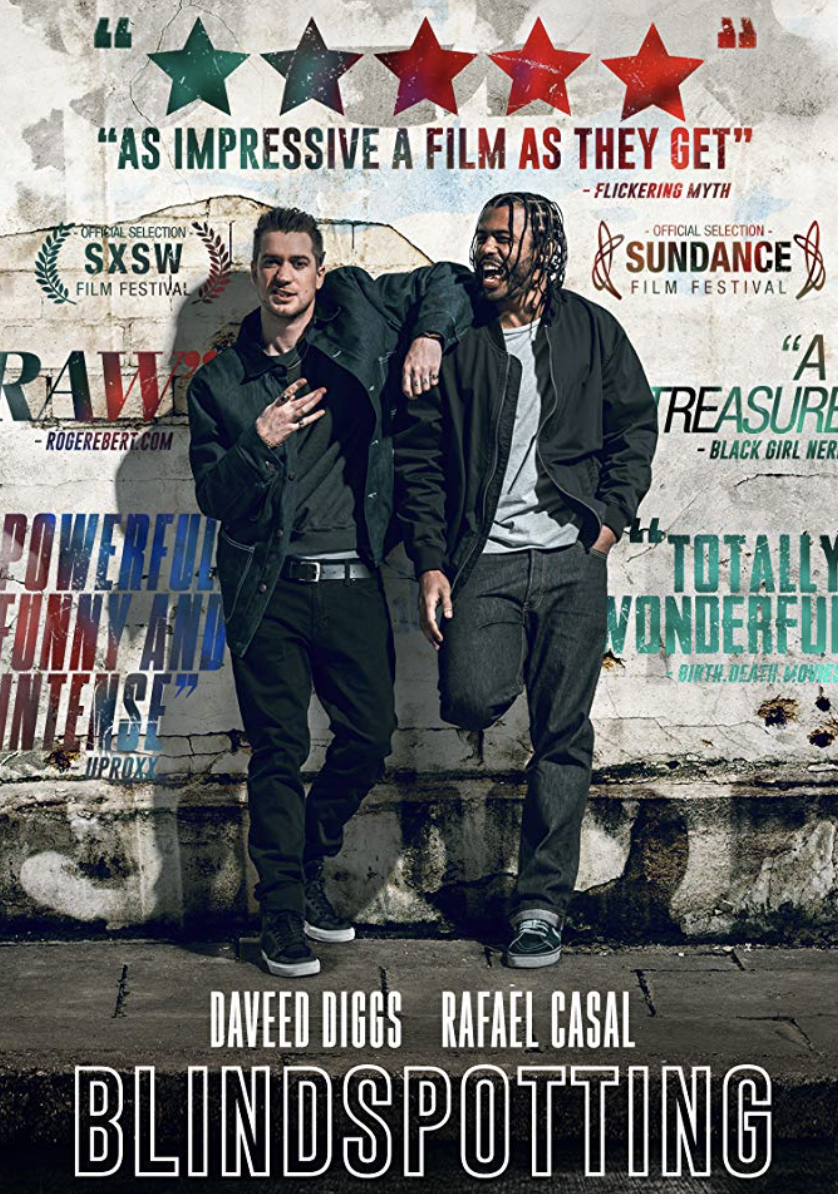This past weekend, “Blindspotting,” directed by Carlos López Estrada and produced by Daveed Diggs, opened at Ragtag. Set in Oakland, the dramatic comedy follows Collins Hodgkins (Diggs), a black man who is on the final days of his year-long probation. He lives in a halfway house with an 11 p.m. curfew and works for a moving company with his best friend, Miles, played by Rafael Casal.
Much of the film’s humor comes from Hodgkins’ unfortunate predisposition to be in situations that could violate his probation, whether it be missing curfew by five minutes, or his best friend purchasing an illegal firearm in front of him.
The movie’s central conflict occurs when Hodgkins witnesses a black man shot by a police officer on his way home from work, despite the fact that the man had his hands up and pleaded with the officer not to shoot. Due to the fact that Hodgkins was out past his curfew at the time, he cannot come forward with an account that could possibly indict the officer without risking extending his sentence. This begins to eat at Hodgkins, affecting his mental state throughout the entire film before causing a breakdown in the final scenes of the movie.
Hodgkins’ interaction with police officers and incapability to speak the truth of the situation aligns well with the reality of police brutality. Many scenes in the movie show the media portraying the man killed as a shady character, insinuating that the officer was in the right to kill him. One scene in particular has Miles watching the news when the local station uses a mug shot for the man killed and a picture of the officer in uniform, referencing many similar situations in which photos are used in favor of the police officer.
The setting of Oakland provides a basis on which comments on gentrification can be made, whether they be in the form of jokes or comparisons. The opening scene of the movie shows two sides of the city: one with older, family-run markets and a larger sense of community, and another with Whole Foods on every corner and citizens glued to their phones. One sequence shows Miles receiving a shirt that says “Kill a Hipster, Save your Hood,” and subsequently wearing the shirt to a party hosted by some of the local “hipsters.” A running gag throughout the film makes fun of a local restaurant called “Qwik Way” that has been completely renovated. The fast food spot now serves vegan burgers, with patrons having to go out of their way to order a burger with beef. This and the fact that the restaurant also caters (therefore contradicting its name) angers Miles for the entire movie.
This commentary ties in very well with the real-world issues of gentrification. With many younger, more affluent generations moving into cities such as Oakland for their lower rent and aesthetic value, problems arise for original citizens. A large influx of a new demographic to cater to (and one with more money than most others) often cause landlords to raise prices of rent. This creates a deadly class divide, one where residents who have lived in their homes for years can no longer afford to pay their rent. The appearance of stores like Whole Foods takes business away from family-owned stores and makes it harder to pay for necessities on a lower income.
It is the use of pictures that criminalize black men and women that perpetuate the stereotypes that cause racial bias in police officers. The title of the film references one of the final scenes, in which Hodgkins’ love interest, Val (Janina Gavankar), uses the word to help her remember the Rubin vase for her psychology class. The vase is a common visual illusion in which a picture of a vase can also be perceived as two faces. Val uses the term “blindspotting” to help her remember due to the phenomenon’s manipulation of the eye’s blindspot to focus on one image. Val mentions that because of the blindspot, unless you train your mind to do otherwise, you will always see what was presented to you.
“Blindspot” fit perfectly with how black men and women are perceived by police officers. Since stereotypes are what have been ingrained into police officers’ minds, unless they train themselves, the first thing they will think when they see a black man or woman is what the media portrays them as. This is why it is important to have unbiased representation in media, whether it be a TV show or the local news. Breaking stereotypes and retraining ourselves to perceive someone as who they really are instead of relying on the first image that comes to mind is an important reminder in this film.
“Blindspotting” provides audiences not only with a laugh, but challenges them to think about how we perceive others and how gentrifying neighborhoods affects their residents. It’s a film worth watching and discussing.
_Edited by Siena DeBolt | [email protected]_








